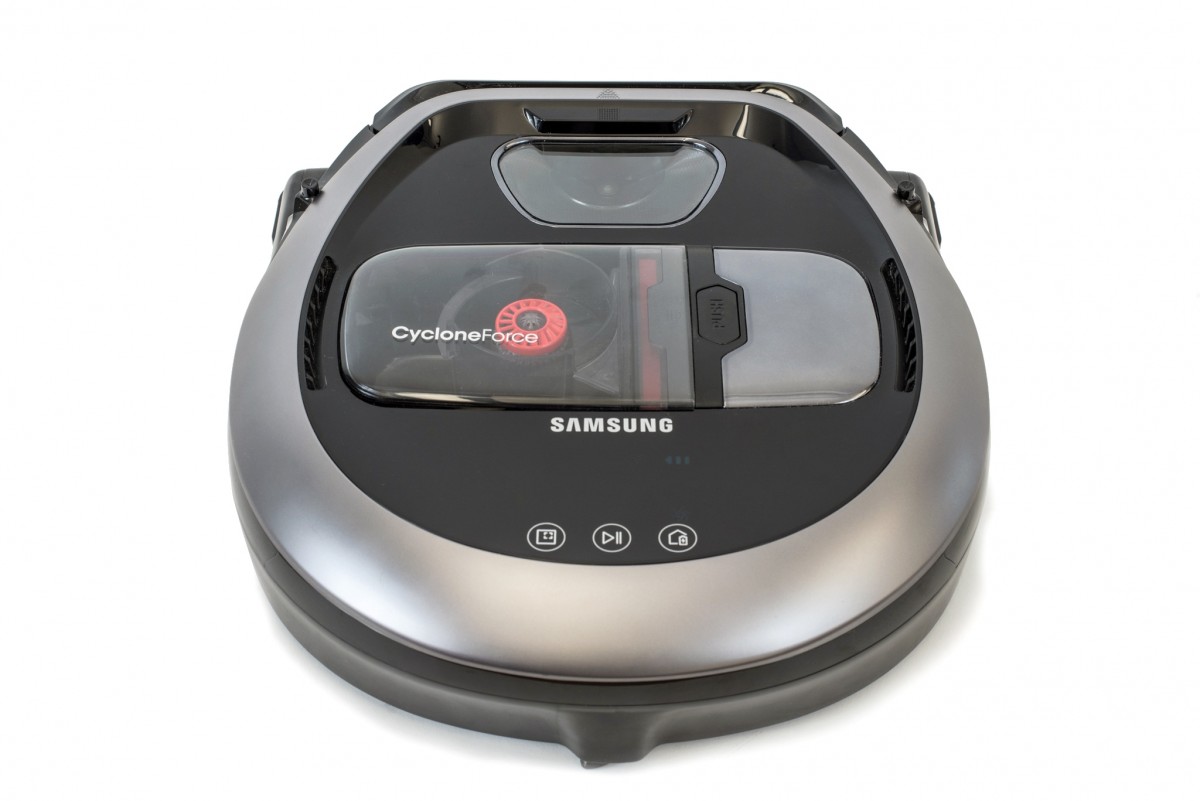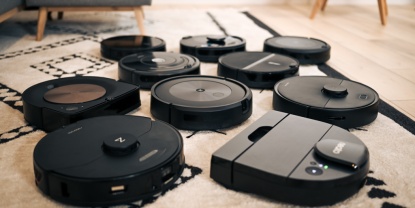Samsung POWERbot R7070 Review
Our Verdict
Our Analysis and Test Results
The Samsung POWERbot finished right behind the Roomba 960 and ahead of the Roomba 690, making it the lowest scoring of the systematic cleaners — all the robots that scored worse bounce around in a semi-random way, essentially limiting them from reliably cleaning multiple rooms at once. However, the 690 still scored better than the POWERbot R7070 in our navigation test, highlighting just how poor the Samsung performed. The POWERbot does clean a tiny bit better than the 960, but can't come close to matching its obstacle avoidance skills and smart features.
Navigation
The weightiest of all our metrics, Navigation is responsible for 35% of the overall score for each of the robot vacuums in the review. We used a single room filled with simulated furniture to test out how well each robot does at avoiding obstacles, as well as their abilities at driving under furniture and locating their charging base. Additionally, we also tested out how well each robot deals with the transition from light to dark flooring, as this can trigger a false-positive for some of the different edge detection sensors that prevent the robot from driving down stairs. The Samsung gave a mediocre performance on the whole, meriting it a 5 out of 10 for its so-so showing.
The robot didn't do particularly well at navigating around a furnished room, avoiding the more confined areas, but still managing to become trapped and needing assistance. We found that the Samsung usually stayed stuck once it became trapped, rather than eventually freeing itself like some of the other vacuums.
However, this robot can usually quickly and effectively find its docking station when commanded to, even when it is in a different room.
This robot drives under low furniture without issue, but it does have a higher physical profile than many of the other robots, preventing it from driving under the lowest pieces of furniture — usually a sofa or some bed frames.
The R7070 also struggled with high-contrast flooring, tending to detect it as a drop and refused to drive over the transition.
Home Coverage
Our Home Coverage metric ranked next in terms of weight, accounting for 20% of the total score for each model of robot vacuum. We based the score for each product on how much of a single, fully-furnished room it actually cleaned, as well as the effectiveness of the spot cleaning function and the amount of ground covered. We also took the ability of the robot to clean multiple rooms and automatically recharge if necessary and the barrier system — if there is one — into account when calculating scores. The Samsung POWERbot again failed to deliver an amazing performance, though it did do above average, earning a 6 out of 10 for its efforts.
This robot definitely left large areas of our furnished room uncleaned, entirely skipping the tighter areas, like the dining room table and chairs. It also occasionally became trapped in areas for inordinate amounts of time, cleaning them excessively.
The barrier system on the Samsung POWERbot R7070 is about average, relying on a physical strip of magnetic tape to demarcate areas where you don't want the robot to clean. This system is a little less convenient than the virtual wall methods, but is still quite effective.
The Samsung also has a decent spot clean function, covering an area of about 42 sq. ft, spiraling out from a center point. However, this robot only completes a single pass of the area and didn't do a particularly impressive job cleaning, leaving behind plenty of debris.
The R7070 does handle cleaning multiple rooms relatively well and can automatically return home, recharge, and resume cleaning if necessary in its cleaning cycle.
Carpet Cleaning
Moving on to how well the R7070 actually cleaned, we started by testing it out on carpet, using both low-pile and medium-pile carpet. We spread out different types of debris, then scored the performance of the R7070 on how much it sucked back up. Additionally, we also tested out its edge and corner cleaning ability. The POWERbot did well, receiving a 6 out of 10 for its efforts in this metric, which comprises 15% of the total score.
This robot does amazingly well at cleaning the corners and edges of a room, only leaving an intermittent line of debris along the edges of our testing pen that measured about 1" across at its maximum. When it comes to corners, the Samsung is by far one of the best of the entire group, getting virtually all of the mess through its corner specific cleaning routine.
This robot continued its strong showing in our fine particle collection challenge, sucking up the majority of the flour that we laid out on the flatter carpet. We didn't do this test on the fluffier carpet, as that is asking a bit too much out of any of these products and is a task much more suitable for a non-robotic vacuum.
Moving on to our medium particle tests, the performance of the Samsung varied wildly, doing exceptionally well at collecting rice and quite poorly at cleaning up oats. It only left about ⅛ of a teaspoon of rice in the fluffy carpet and slightly less for the flat carpet. It tended to plow the rice around on the flat carpet, so it probably would have reduced this number even further given sufficient time. For the oats test, the R7070 failed to collect the majority of the oats, leaving behind a substantial amount on the flat carpet. It left a little less on the fluffier carpet, but it was still a substantial amount.
This product finished out our carpet cleaning tests with an average showing in our large particle test, only missing 1 or 2 mini-wheats on both types of carpet.
Hard Surface Cleaning
Next, we moved on to assessing how each product did at cleaning up hard floors, repeating the same tests as the prior metric on a section of laminate flooring instead of carpet. The POWERbot did very well, meriting an 8 out of 10 in this group of tests, which also comprise 15% of the total score.
This product again delivered a superb performance in the edges and corners test, receiving one of the highest scores of the entire group. It cleaned each corner entirely and only left a small strip about ¼ of an inch across along some of the walls.
The R7070 continued its hard floor dominance into our flour collection test, only leaving a barely discernible residue behind. However, it didn't really clean all that well in the cracks between the board, but neither did any other robot vacuum.
It also did very well when tasked with collecting medium-sized debris, only leaving one or two grains of rice behind and three or four oats. We also appreciated that this model didn't have a rotating brush that flung the rice or oats around, like many other products.
Unfortunately, the performance of this product plummeted when it came large particles, failing to collect any of the mini-wheats.
Pet Hair
For those with pets, having a robot vacuum clean up after your fur-babies can be a total blessing. To test this, we used hair donated by a local groomer spread out on both flat and fluffy carpet, then scored each 'bot on the percentage of hair it picked up. Together, these two tests account for 10% of the total score for each vacuum.
The Samsung R7070 did very well again, earning a 6 out of 10 for its results. It got about 36% of the hair from the low-pile carpet and about 34% of the hair from the fluffier carpet.
Smart Connect
Finally, we evaluated and scored the various smart features and functions available on the Samsung for the remaining 10% of the total score. The POWERbot is about average when it comes to these features, earning it a 5 out of 10.
This robot has both a mobile app and a handheld remote, as well as a few buttons right on the robot itself. You can start a spot or whole home clean or send the robot home through the buttons on the device itself, but that is about it.
The handheld remote lets you set a basic 7-day schedule for a daily clean, start the robot, or even drive it around manually. This robot was so-so in terms of WiFi reliability, requiring us to reset it a handful of times to re-establish a connection. The mobile app also wasn't our favorite, with our testers finding it to be quite buggy and limited in functionality compared to other products.
However, this model is compatible with Alexa, Google Home, and IFTTT smart home systems.
Value
All in all, the R7070 definitely isn't a great value pick, being outperformed by other robots that cost significantly less.
Conclusion
We weren't the biggest fans of the Samsung, but if you have a very open house with almost no clutter or confined spaces and tons of hard flooring, it might be a great bet. Otherwise, we would recommend you consider a different model.

























